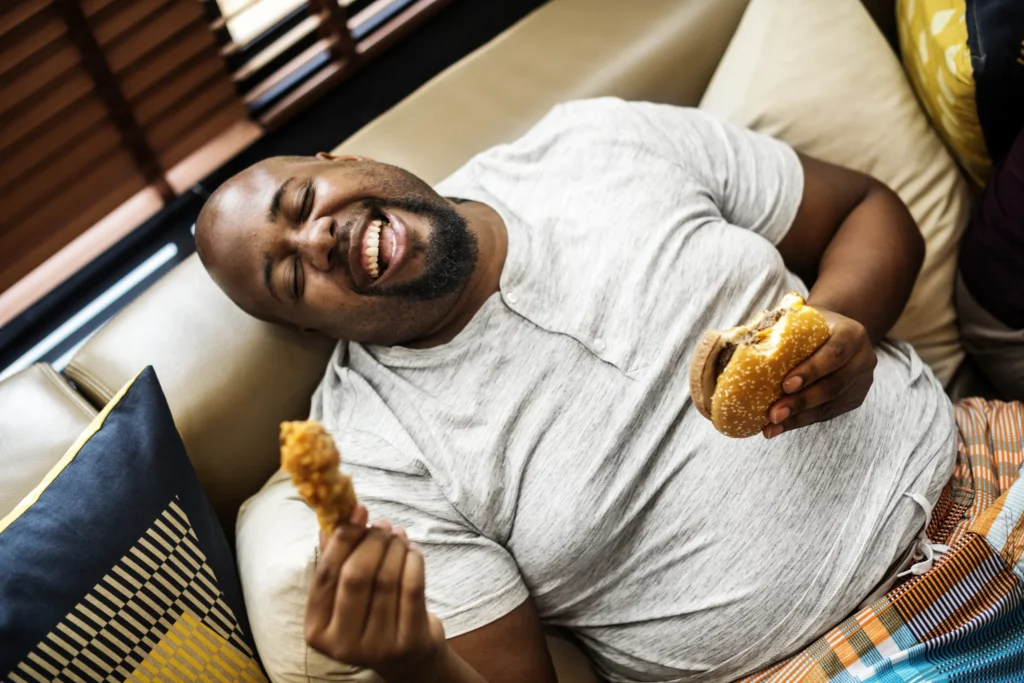Read time : 3 minutes

So, What Exactly Is Binge Eating?
Binge eating is not just about eating a lot of food—everyone’s had a second helping now and then. It’s when you can’t stop, even when you want to.
You eat fast. You eat when you’re not hungry. You eat alone. And afterward? You feel guilty, embarrassed, sometimes disgusted.
It’s not “bad behavior”—it’s a recognized eating disorder, and it can seriously affect both your physical and mental health.
Why Does Binge Eating Happen?
For many people, binge eating is like pressing the mute button on uncomfortable feelings. Stress, sadness, boredom—food becomes the escape route.
But sometimes, it’s not just emotional. Restrictive dieting, hormonal imbalances, and even childhood trauma can plant the seed.
Here’s the tricky part: the more you restrict yourself (“I’m never eating chocolate again!”), the more likely you are to binge on it later. It’s a vicious cycle.
The Cost of Binge Eating
Beyond the emotional toll, binge eating can lead to:
- Weight gain and obesity
- Increased risk of diabetes and high blood pressure
- Anxiety and depression that only deepen the cycle
- But let’s not stop at the problem. The solution is where it gets interesting.
How to Stop Binge Eating (for Good)

This isn’t about willpower. It’s about strategy. And science backs it up.
Here’s what works:
- Get Your Mind Right (Cognitive Behavioral Therapy)
Binge eating often starts in the mind before it ever reaches the plate. Cognitive Behavioral Therapy (CBT) helps untangle the messy thoughts that lead to overeating. Studies show it works for most people. - Eat Like You Mean It (Mindful Eating)
Next time you eat, slow down. Chew. Taste. Listen to your body. Are you actually hungry—or are you bored, stressed, or tired?
One study found that mindful eating reduced binge episodes by as much as 75%. - Don’t Skip Meals—Seriously
Skipping meals sets you up for a binge later in the day. Regular, balanced meals help keep hunger in check before it becomes uncontrollable. - Feelings First, Food Later
Is food your emotional first aid kit? Try writing it out first—journaling or even voice notes. Replace food with actual comfort—call a friend, take a walk, or just sit with the feeling. - Forget Extreme Diets
Swearing off carbs forever? Saying goodbye to rice for life? That’s a fast track to bingeing later. Choose balance, not extremes.
Need Help? You’re Not Alone.
Breaking free from binge eating isn’t easy—but it’s absolutely possible. Therapists, dietitians, and support groups can be part of your team. In fact, combining therapy with nutrition advice gives the best results long-term.
Final Thought: It’s Not About Willpower—It’s About Healing
Binge eating isn’t about being weak. It’s about being human. And the more we understand it, the easier it becomes to break free.
If you’ve ever found yourself standing by the fridge wondering, “Why am I doing this?”—know this: you’re not alone, and you can take control again.
Start small. Stay curious about your habits. And most importantly—be kind to yourself along the way.
Meet Your Ai Personal Trainer
Download the App to Take your free Ai health assessment Today [Take Assessment]
RD, LD Julius Sammah
MyHealthCop Certified Dietician